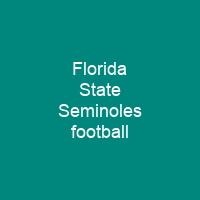The Florida State Seminoles Football Team: A Legacy of Glory and Triumph
Imagine a team that has been playing football for over a century, with a rich history filled with triumphs and legends. That’s the story of the Florida State Seminoles. Since 1902, this team has not only represented Florida State University but also embodied the spirit of competition and excellence in American college football.
A Brief History and Early Days
The Seminoles’ journey began in 1902 when they played their first game under the Southern Intercollegiate Athletic Association. It wasn’t until 1947 that the team adopted its iconic nickname, “Seminole,” a nod to the Native American tribe of Florida. The name change marked a new era for the program, setting the stage for future greatness.
Key Milestones and Achievements
The Seminoles have achieved numerous milestones that have etched their names in college football history. They’ve won three national championships, nineteen conference titles, and six division titles. These accomplishments are a testament to the team’s unwavering commitment to excellence.
Notable Coaches and Players
The Seminoles have had their fair share of legendary coaches like Bobby Bowden, who led the team to national prominence with his innovative strategies. Under Bowden, the Seminoles set an NCAA record for consecutive Top 5 finishes and won 14 consecutive seasons with 10 or more wins.
But it’s not just about coaching; the players have also left their mark on history. Three Heisman Trophy winners—Charlie Ward, Chris Weinke, and Jameis Winston—have led the team to unprecedented heights. These players’ achievements are a reflection of the Seminoles’ commitment to excellence.
Recent Developments
In recent years, under Mike Norvell’s leadership, the Seminoles have continued their tradition of success. Despite facing challenges like their worst record since 1974 in 2024, they remain a formidable force in college football.
Home Field Advantage and Rivalries
The Seminoles play their home games at Doak Campbell Stadium, which has been the cornerstone of their success. The stadium’s capacity of 79,560 seats ensures a formidable home field advantage, with the Seminoles boasting one of the best gameday atmospheres in the country.
Florida State’s rivalries are legendary, especially against Florida and Miami. These games have been played for over six decades, with each team holding its own in these intense matchups. The rivalry with Clemson is another highlight, where the Seminoles have emerged victorious more often than not.
A Legacy of Triumph
The Florida State Seminoles football program has a legacy that spans over a century. From their early days to their current status as one of the most successful programs in college football, the Seminoles have consistently demonstrated their commitment to excellence and competition.

As the Seminoles continue their journey, they carry with them a rich history and a legacy of triumph. Whether it’s on the field or in the hearts of fans, the spirit of the Seminoles lives on, inspiring future generations to strive for greatness.
The Florida State Seminoles football team is more than just a group of players; it’s a symbol of resilience, determination, and the pursuit of excellence. Their story is one that continues to inspire and captivate fans across the nation.
You want to know more about Florida State Seminoles football?
This page is based on the article Florida State Seminoles football published in Wikipedia (retrieved on January 20, 2025) and was automatically summarized using artificial intelligence.







